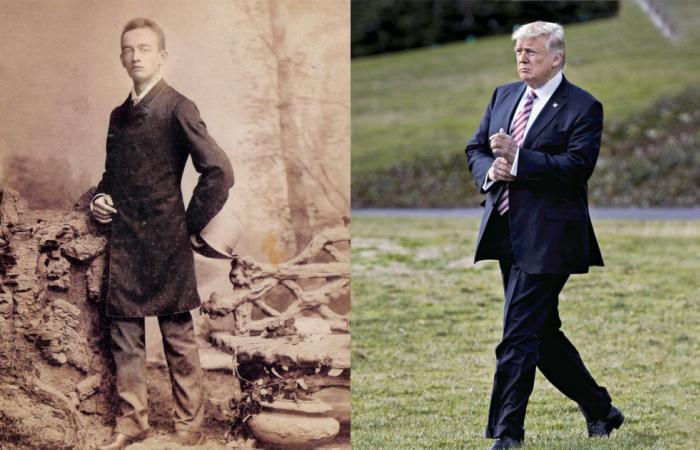TIt all started with a hairdresser’s apprentice. Donald Trump’s grandfather, born Friedrich Drumpf, came to Manhattan from Germany at the age of 16. On October 19, 1885 he looked out over New York Bay for the first time; the Statue of Liberty was under construction.
He made a journey of about ten days from the city of Bremen aboard the passenger ship SS Eider. She had a third class ticket; She was traveling in an open space in which emigrants were crowded together, locked at the same time, all the time, in an area without bathrooms or showers.
The young German did not come from an easy situation either. The Drumpfs had some land in Kallstadt, a wine-growing town in Bavaria, but when his father died they went bankrupt to pay the medical debts that his emphysema had caused. Friedrich then trained as a barber, but in that town of just over a thousand inhabitants, that was not enough to live on either. So one day, he packed the backpack and, without telling his mother, he embarked.
He amassed a small fortune in Seattle with a restaurant that offered alcohol, food and “ladies’ rooms,” a euphemism at the time for a brothel.
He wanted to reunite with his sister Katherina, who had traveled to New York before him, and between them send money to his family. It was not easy to make one’s way in that city where immigrants disembarked daily.
Seeking better fortune, five years later, Friedrich decided to move to Seattle, where, boarding the gold rush train, he amassed a small fortune with a restaurant that offered alcohol, food and “rooms for ladies”, a euphemism of the time for prostitution.
Friedrich became an American citizen in Seattle, changed his surname to the more pronounceable and Anglophone Frederick Trump, and in 1892 voted for the first time in a presidential election. Then, the naturalization process was simple: it was only required to have lived seven years in the country and provide the testimony of someone who attested that the applicant had “good character.”
Already with money, Trump traveled for the first time in 15 years to Kallstadt, where he met Elizabeth Christ, a neighbor’s daughter, 11 years his junior. They married in 1902 and settled in New York, but Elizabeth missed Germany and in 1904 they returned with the intention of staying. The surprise was that Frederick had lost his German citizenship. German authorities believe that his trip to the United States, which was not notified, was intended to evade mandatory military service. It was no use begging; he had to return to New York in 1905.
With the money amassed in Seattle, now permanently settled in New York, Frederick opened more stores and hotels until he formed a small empire. He began buying land and small properties in Queens, an area of the city that he would develop in the following years and that would be the seed of the family’s future real estate empire. But Frederick could not advance much. First, because he had to be more discreet in his business during World War I; Being German made him a suspect. And then, because of his sudden death. He died a victim of the 1918 flu epidemic at the age of 49.
It was then his wife who took charge of the businesses, allied with the eldest of her children, Fred Junior, the father of the now candidate to renew the position of president of the United States, Donald Trump.
Fred was only 13 years old when he began running the family’s restaurants and properties with his mother and who, weathering the Great Depression, built the emporium that the fourth of his five children later inherited and multiplied. It was Fred Junior who introduced Donald to the world of real estate and who transmitted to him the instinct for business summarized in the phrase: “Winning is everything, there are no limits.”






